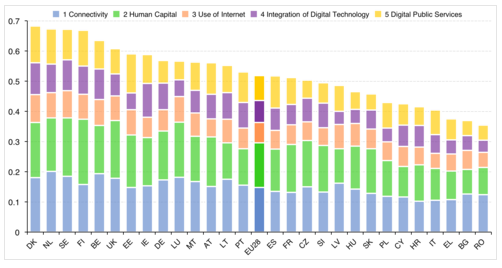Europe marks mixed progress towards digital economy
 Europe has made progress towards achieving a digital economy over the year since the inauguration of the EC’s digital single market strategy, but the pace of that progress is slowing down, according to the Commission’s Digital Economy and Society Index (DESI).
Europe has made progress towards achieving a digital economy over the year since the inauguration of the EC’s digital single market strategy, but the pace of that progress is slowing down, according to the Commission’s Digital Economy and Society Index (DESI).
Overall, the EU achieved a DESI score of 0.52 this year, up from 0.50. the two fastest growing elements of the index were connectivity and integration of digital technology. However, development of human capital and digital public services more or less stagnated this year.
The highest scoring countries on the DESI, which measures connectivity, digital human capital, the use of the internet, the integration of digital technology and digital public services, for this year were the Denmark Netherland and Sweden, with Greece, Bulgaria and Romania trailing at the rear.
Countries whose score exceeded the average and which are developing at a faster pace than the EU average included Austria, Germany, Estonia, Malta, the Netherlands and Portugal. The UK, Belgium and Sweden were among a group of countries with an above average score but whose growth has been slower than the EU average.
Countries with a below average score that are catching up include Spain, Italy and Romania, while the group of countries that are below average and falling behind includes France, Greece, the Czech Republic, Hungary and Poland.
“More and more people, businesses and public services are going digital. But too many of them still face problems such as a lack of high-speed internet coverage or cross-border e-government, as well as difficulties in shopping and selling across borders. We need to fix this. This is what our Digital Single Market Strategy aims to do. The first proposals under the Strategy will boost e-commerce and connectivity. All our proposals will be on the table this year and I encourage EU Member States to lose no time in supporting them. These proposals will help them boost their digital performance and economies,” said EU VP for the digital single market Andrus Ansip.
“The EU makes progress, but too slowly. There is no room for complacency. Action is needed if we want to catch up with Japan, the USA and South Korea. Based on today’s Index, we will come forward in May with concrete recommendations for EU Member States to improve their national performances. With this, combined with our work to create a Digital Single Market, I am sure that the EU as a whole and its Member States will do much better in the coming years,” said Günther Oettinger, Commissioner for the digital economy and society.



